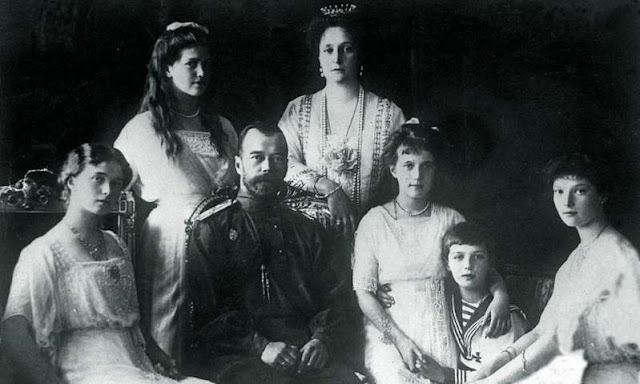 |
| ‘In September 1898, the Skibbereen Eagle proclaimed it would ‘keep its eye on the Emperor of Russia, and all such despotic enemies of human progression.’ Tsar Nicholas II with his family in 1914. |
The source is sometimes said to have been a newspaper in Tasmania, the Mercury, and sometimes a paper in Nelson, New Zealand. In the column I said the story might be apocryphal. As often happens, readers and researchers mobilised, so here is an Update.
 |
| The royal couple of russia, tsar nicholas ll and tsarina Alexandra fyodorovna with their son |
Fame attached and endured, so much so that the paper that absorbed the Eagle, the Southern Star, could confidently publish in 1946 a cartoon of Ireland’s then taoiseach, Éamon de Valera, in one-to-one talks with the Soviet dictator Joseph Stalin, who murmurs through pipe smoke: “Between ourselves, Dev, Russia has never quite forgotten that article in the Skibbereen Eagle.”
In all human probability, that despotic monarch will never see these lines which we now pen, but our duty, as public journalists, demands that we should write them. The pen, a great writer has wisely said, is mightier than the sword, and we feel that the humble nib which we now grasp outweighs the present Emperor’s blade, although he may never know it.”
 |
| RUSSIAN EMPIRE - circa 1900: Tsar Nicholas II Romanov. Russia, circa 1900. |
It is not conclusive proof of a spoof that this excerpt appeared in a humour journal modelled on London’s Punch. As Private Eye still regularly shows, actual newspapers remain capable of similar grandiloquence.
So, was Melbourne Punch quoting from an actual small-town newspaper? No – the initial clue is in the masthead’s tweak to Croajingolong, a beautiful and remote part of the far south-eastern tip of mainland Australia.
Perhaps it was a fashionable form of mockery in the period, to chide others about their “we warn the tsar” moments. That could explain the cluster.
The plucky Gazette was not deterred. Two copies of the paper would be mailed to the Tsar, “if they are not filched in their passage through the Russian post office”, and although warmongering advisers might “dash the current number of the Croajingergoalong Gazette from His Majesty’s irresolute hand … we may yet hear of him walking into the council of the assembled heads of the nation, and holding the Croajingergoalong Gazette aloft in his hand, ‘There shall be no war; this little print has pointed out to me my duty’.”




